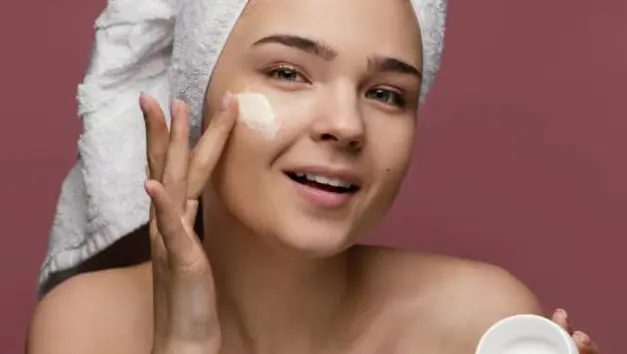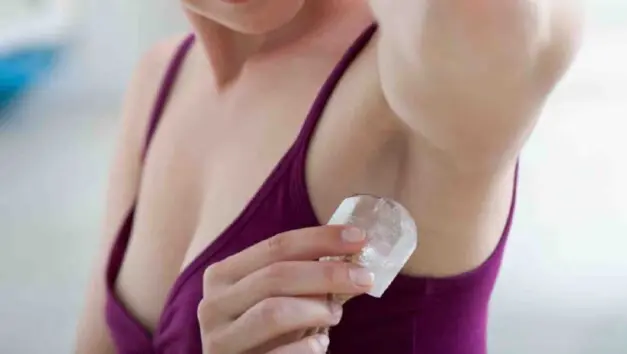Alum for Your Skin: Best 1 Guide
Alum, also known as fitkari, is recognized for its skin-care advantages, including astringency. We inform you if you should apply alum on your skin or not.
Alum is healthy for the skin. Image credit of Freepik
Alum, also known as fitkari, is a natural salt composed primarily of potassium alum. The colorless or white material, which is frequently found in crystal form, is popular among those who prefer natural deodorants. Some men take it after shaving to help prevent razor bumps, mild bleeding, and discomfort. Women can also use it! Alum may tighten and shrink skin tissues, hence minimizing the appearance of pores. Its natural antibacterial characteristics may also aid to treat acne. Continue reading to learn more about the advantages of alum on the skin and how to use fitkari for skincare.
Fitkari skincare advantages
Also Read;
Skincare products must be administered with consideration for skin type. Always do a patch test first. Image credit of Freepik
What is fitkari or alum?
Dr. Aparajita Lamba, a dermatologist, defines alum as a collection of chemical compounds made up of aluminum sulfates plus another metal, generally potassium or sodium. Simply put, alum is a form of salt.
[web_stories title=”false” excerpt=”false” author=”false” date=”false” archive_link=”true” archive_link_label=”” circle_size=”150″ sharp_corners=”false” image_alignment=”left” number_of_columns=”1″ number_of_stories=”5″ order=”DESC” orderby=”post_title” view=”circles” /]
What are the advantages of alum on the skin?
Alum has several advantages, and it might be beneficial to your skin for the reasons listed below:
Also Read; Alum : Benefits, Precautions and Dosage – 1mg
Alum is commonly used as a deodorant. Image credit: Adobe Stock.
1. astringent properties
Alum, also known as potassium alum or aluminum potassium sulfate, has astringent qualities when applied to the skin. According to the expert, astringents function by inducing proteins in skin cells to coagulate, resulting in the shrinkage of skin tissues. This tightening effect helps to diminish the appearance of pores while also controlling excess oiliness on the face. Alum constricts the skin, giving it a smoother and more matte look, making it a popular ingredient in skincare products designed to manage oily skin and reduce pore size.
Natural deodorant alum
2. May prevent acne.
When used topically, alum can help prevent infections in small cuts, scrapes, and wounds by eliminating germs that might otherwise cause them. This antiseptic activity makes alum useful for acne-prone skin, since it can help eliminate the germs that cause acne outbreaks. Its antibacterial properties make it an excellent complement to skincare regimes for preserving clear and healthy skin.
3. Deodorant action
Alum has a number of interesting applications, including natural deodorant. According to a 2016 study published in the Journal of Clinical and Health Sciences, alum has good antimicrobial properties against body odor-producing bacteria and may be used either as a topical treatment or as an active component in deodorants. It works by suppressing the growth of odor-causing bacteria on the skin, especially in perspiration-prone regions like the underarms. These bacteria are responsible for converting perspiration into chemicals that emit unpleasant scents. When applied to the skin, alum generates an environment that is less conducive to bacterial development, hence reducing body odor.
4. Exfoliation.
Alum can help in exfoliation, a procedure that removes dead skin cells from the skin’s surface. While alum is not a conventional exfoliator like scrubs or peels, it does have moderate abrasive characteristics that can help loosen and remove dead skin cells when used in skincare products. According to Dr Lamba, this moderate exfoliation creates a smoother, more radiant complexion by revealing younger skin below.
5. Skin Tightening
When applied topically, alum has been shown to temporarily tighten the skin. This tightening effect is caused by its astringent qualities, which cause the skin to constrict and become firmer. While the impact is just transitory and mostly cosmetic, alum can make the skin seem more young and lifted, which helps to reduce the appearance of fine lines and wrinkles.
How to apply alum on the skin?
- When using alum to the face, dilute it with water since it can be abrasive if applied straight. Here are some methods to use aluminum:
- You may massage wet alum straight on your body.
- For the face, combine it with rose water to produce a thin paste.
- It may be dissolved in water and used as a natural toner.
Alum for skin benefits
What are the adverse effects of alum on skin?
If you have sensitive or dry skin, use it once a week. According to the expert, oily skin might benefit from using it 2 to 3 times each week. Overuse might cause adverse effects such as:
Alum skin tightening
- Skin inflammation and redness
- Burning feeling, especially when used topically.
- Alum can be used with sunscreen, moisturizer, and soothing ingredients like as niacinamide and hyaluronic acid. Also, because alum is moderately exfoliating, avoid using it on peels or scrubs.
Alum may help reduce the appearance of pores and aid acne sufferers. However, do not use it regularly since it might cause skin irritation.
Alum for skin benefits, Alum for Your Skin, Fitkari skincare advantages, Natural deodorant alum, Alum skin tightening
Health Conscious Plus
Welcome to Health Conscious Plus Find health insights, disease management tips, meal plans, and mindful living strategies for a healthier life.



